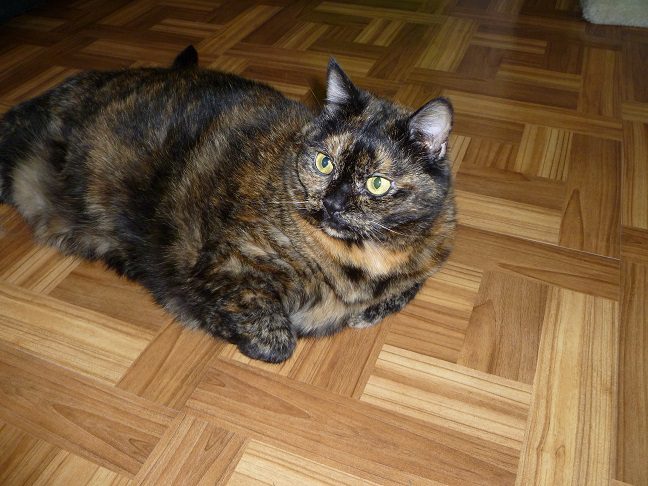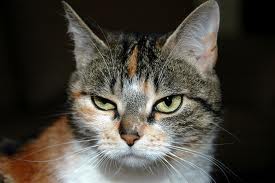Last Sunday was Saint Francis Sunday, a celebration that rivals Easter and Christmas at the Episcopal church I attend. This is because our former rector and my close friend, Marsue, is an animal fanatic and made a big deal about the Blessing of the Animals liturgy that comes around every October. My dachshund came along as she has for many years; Frieda has often accompanied me to the lectern as I read the Old Testament reading from Judges about Balaam’s ass. But today my mind is wandering to another animal from whom I learned many spiritual lessons in my youth.

How can an overweight, close-to-obese cat who died more than thirty-five years ago occupy a central place in my history? Allowing for imperfect memory, by my unofficial count I have had at least a dozen cats and dogs as pets since she died,but Stokely is the center of gravity in the menagerie of four-leggers that has intersected with my life. Remembering Stokely connects me with the better parts of my youth—humor, laughter, my father at his best. Remembering Stokely also makes me think differently about what God might be up to with us human beings. Not bad for a cat.
Stokely almost didn’t end up in my life at all. In the summer between my sixth and seventh grade years, my family was moving about 40 miles north, from a rural and isolated location to what serves in Vermont as suburbia. One of our two dogs had died during the previous year; our other dog, an elderly collie who was strongly attached to our next door neighbor, was deemed too old to make the move and stayed with the neighbor.
Pet-less for the first time in my life, I asked for a cat. We had never had a cat—I didn’t even know anyone with a cat. But I thought a cat would be cool. My father did not. He had never had a cat, and my request struck him as another odd, peculiar request from his youngest son who would not hunt, tended to be overly emotional, and just didn’t fit the mold of a typical son. And now he wanted a cat instead of a dog, for God’s sake.
I worked on Dad all summer, and knew I had him when he proposed one of his random, off-the-wall bargains. “We can get a cat if he’s black and if we name him Stokely after Stokely Carmichael.” This was 1967, and the civil rights movement was in full swing. In my father’s peculiar imagination, a black cat named after one of the infamous Black Panthers made sense—why he didn’t propose “H. Rap,” “Eldridge,” “Malcolm,” or even “Dr. King,” I don’t know. “Bruce!” my mother complained. “Good grief,” my brother sighed. “Deal,” I said—we were going to get a cat.
A few weeks later my cousin reported that her co-worker at the local hamburger joint owned a cat that had just produced kittens. The litter had three calicoes with various patterns of white, brown, and yellow and Stokely—all black except for a bit of white on his chest. Stokely’s eyes had just opened a few days earlier and he could barely walk. I deposited him in a box with a bag of dry food from my cousin’s friend, jumped in the car and my mother drove us home.
Stokely was an attraction in my extended familly, none of whom had ever had a cat and none of whom could believe that my Dad, the unofficial patriarch of the extended family, had agreed to have one in his house. One day shortly after his arrival, my aunt picked Stokely up by the scruff of the neck (we had heard that cats like that) and let him hang from her hand—“There’s a problem here!” she announced. “Notice anything missing?” I didn’t, but my brother did—“Stokely’s a girl!”
Not only did Stokely turn out to be a different gender than we had ordered, she turned out not even to be black. She was a calico just like her litter mates—what appeared to be solid black was predominantly dark brown, which became more and more flecked with white, cream, and yellow highlights as she grew up. Her toes were colored individually, with a dark brown, light brown, yellow, and white one on each foot in no particular order. My ever observant father said that she looked like she was assembled out of spare parts. In her later years she became extraordinarily fat; in her early years she exhibited a personality that matched her appearance.
Cats are supposed to be graceful—Stokely was clumsy. Cats are supposed to land on their feet when falling from heights great and small—my brother and I verified by experimentation over and over that Stokely was as likely to fall on her side or even her back as on her feet when dropped from various heights onto my bed. I saw Stokely fall down the stairs to our front door landing more than once when a too-vigorous post nap stretch unexpectedly dislodged her from her spot in the sun on the top stair. Cats are supposed to be introverts and avoid loud noises, but Stokely would run from anywhere in the house so she could ride on the vacuum cleaner while my mother cleaned the floor.
In an email a few years ago, as I considered whether to accept an invitation to take on a huge new position at the college, a trusted friend who I asked for advice wrote that “I find it part of God’s playfulness to just put things out there for which we might be put to good use, stand back and watch how we handle what has come our way.” A playful God who might be entertained and amused by how we handle new situations is non-traditional, to say the least, but I understand the dynamic. My father, brother and I took endless delight—to my mother’s dismay—in slightly rearranging Stokely’s world to see what she would do.  A piece of scotch tape on her back foot or ear, depositing her on top of the piano, putting a cat sized coat on her for the first time—always produced gales of laughter as Stokely first gave us a “when are you bastards ever going to grow up?” look, then deliberately addressed the new problem at hand.
A piece of scotch tape on her back foot or ear, depositing her on top of the piano, putting a cat sized coat on her for the first time—always produced gales of laughter as Stokely first gave us a “when are you bastards ever going to grow up?” look, then deliberately addressed the new problem at hand.
More than thirty-five years after her passing, my crystal clear memories of this obese, made-out-of-spare-parts animal are evidence that she had an impact on me. As I’ve thought about her this week, I’ve become more and more convinced that we are all Stokelys. Although I suspect that most of us would like to believe that we are integrated, focused and sharply defined, we really are little more than random collections of spare parts—most of which are not of our choosing. We do not choose our families, the place and time of our births, our race, our gender, and yet out of these assigned parts—along with those we do have some choice in—we are given the task of constructing a life. And overseeing all of this is something greater than us whose idea of planning and design is apparently something like “How about if I throw a whole bunch of odds and ends together and see what happens?” Psalm 139 says that we are “fearfully and wonderfully made.” If God takes delight in seeing what we make of the bits and pieces we have been given, perhaps we should as well.













